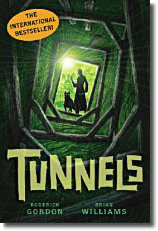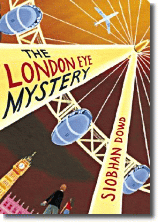In the past two weeks I’ve read four novels back to back that were each very different from one another, but each noteworthy for their lack of predictability. One of them was, of course, The Mysterious Benedict Society. The others are as follows:

Tunnels by Roderick Gordon and Brian Williams
(Scholastic/Chicken House, Jan. 2008)
I’ve read a couple mixed reviews of this book of late, all of which surprised me considerably, as I couldn’t put this book down! What starts as the story of a boy whose strange archeologist father has hooked him on the habit of unearthing oddities, ends as a rollicking subterranean adventure in a world that’s both decidedly sinister and deliciously complex. The descriptions that bring the book’s figures and settings to life were complete enough to make even the most secondary characters step right off the page for me.
It’s been ages since a fantasy book sucked me in with as much speed and force as did this one, and perhaps even longer since I was so surprised by the unexpected twists a story has taken. As I compulsively turned the pages I couldn’t help thinking that there are very few kids in the world who wouldn’t be swept up by this unpredictable adventure, and its forthcoming installments! I am, however, miffed that if our customers embrace this book with the speed I think they will, we will undoutedly lose some sales to their purchasing its sequel overseas. Deeper goes on sale in the U.K. this May but won’t hit American bookstores until January 2009. That’s a long time for true fans (like me!) to wait.

The London Eye Mystery by Siobhan Dowd
(Random House/David Fickling Books, Feb. 2008)
It’s a challenge to write about this book without mentioning the traits it has in common with Mark Haddon’s The Curious Incident of the Dog in the Night-Time. Both books are mysteries narrated by kids on the Autism spectrum. In The London Eye Mystery, said kid is Ted, a teenager with Asperger’s or, as he explains it, "a funny brain that runs on a different operating system from other people’s."
Trouble mushrooms in Ted’s life when his cousin Salim pays their family a visit then goes missing on a family outing to the London Eye. Ted and his sister Kat both saw Salim enter a capsule on the enormous wheel and watched it complete its rotation, but when the passengers disembark from Salim’s "pod," he is not among them. Ted and Kat’s race to figure out what happened to Salim makes for a pleasingly puzzling read that will indeed keep you guessing, as you watch Ted assemble the missing in his own intriguing ways.
While this story is by and large a light one (especially in comparison to Dowd’s previous novel A Swift Pure Cry), there are moments where it shows an emotional depth that belies its tone. These moments appear whenever Salim’s family is forced to confront the fact that Salim might not be coming home, and consider the terrible fates that might have befallen him. I couldn’t help connecting these little nods to mortality to the fact that Siobhan Dowd passed away just this past August. To quote from her web site: "Siobhan died on 21st August 2007 aged 47. She had been receiving treatment for advanced breast cancer for 3 years and, did not go gentle into that good night." Because I can’t decide which of her obituaries impressed or moved me more, the one in the Guardian or the one in the Independent, I say read both.

Cicada Summer by Andrea Beaty
(Harry N. Abrams/Amulet Books, May 2008)
Four things led me to move this book immediately to the top of my read-these-a.s.a.p. pile:
1.) I loved the cover.
2.) I’ve really been enjoying Andrea Beaty’s picture books (a new favorite is Doctor Ted, which is being published this April — see a sneak preview on Pascal LeMaitre’s web site).
3.) I could tell it was a short book — one I could read in under two hours, which is helpful for someone who is forever hoping to increase her BPM (Books Per Month).
4.) It’s about a girl who’s obsessed with Nancy Drew. Enough said.
The closest book I can think to compare this one to is Love, Ruby Lavender. Though Cicada Summer strikes a more serious tone than Deborah Wiles’ first novel, in both books a likeable tomboyish girl is too traumatized by the loss of someone close to her to open up about it to anyone in her small Southern town. In the both books this girl is nurtured by her relationship with an elderly woman. In both books this girl finds her closest friend in someone who seems an a very unlikely prospect. In this book, though, the unlikely prospect is a girl in some rather serious danger — the kind of danger that would benefit from an observant girl sleuth.
This book snuck up on me. I couldn’t *quite* decipher the mystery on these pages before it was finally brought together for me. And I wasn’t fully aware of the extent to which it had me in its clutches emotionally, until I hit a page that turned on the water works and found me reaching for the nearest box of tissues. I wound up reading Cicada Summer from cover to cover in one sitting, too drawn in by the its story and characters to be able to set them aside. Which is, come to think of it, what used to happen to me while reading Nancy Drew….

Thanks for this – I am going to go looking for a copy of The London Eye Mystery this week. I liked Tunnels too, but I have to say I found the ending awfully frustrating. I do like an ending that feels like an ending, even if there is the promise of a sequel. A recommendation from another grown-up Nancy Drew fan is The Mystery of the Martello Tower by Jennifer Lanthier. Came out in Canada last year but there’s a U.S. edition listed for spring 2008.